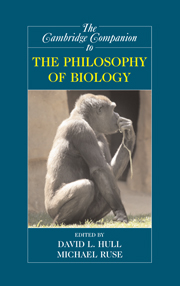Book contents
- Frontmatter
- 1 Adaptation
- 2 Population Genetics
- 3 Units and Levels of Selection
- 4 What’s Wrong with the Emergentist Statistical Interpretation of Natural Selection and Random Drift?
- 5 Gene
- 6 Information in Biology
- 7 Reductionism (and Antireductionism) in Biology
- 8 Mechanisms and Models
- 9 Teleology
- 10 Macroevolution, Minimalism, and the Radiation of the Animals
- 11 Philosophy and Phylogenetics: Historical and Current Connections
- 12 Human Evolution: The Three Grand Challenges of Human Biology
- 13 Varieties of Evolutionary Psychology
- 14 Neurobiology
- 15 Biological Explanations of Human Sexuality: The Genetic Basis of Sexual Orientation
- 16 Game Theory in Evolutionary Biology
- 17 What Is an ‘Embryo’ and How Do We Know?
- 18 Evolutionary Developmental Biology
- 19 Molecular and Systems Biology and Bioethics
- 20 Ecology
- 21 From Ecological Diversity to Biodiversity
- 22 Biology and Religion
- 23 The Moral Grammar of Narratives in History of Biology: The Case of Haeckel and Nazi Biology
- Reference List
- Index
- Series List
14 - Neurobiology
Published online by Cambridge University Press: 28 April 2008
- Frontmatter
- 1 Adaptation
- 2 Population Genetics
- 3 Units and Levels of Selection
- 4 What’s Wrong with the Emergentist Statistical Interpretation of Natural Selection and Random Drift?
- 5 Gene
- 6 Information in Biology
- 7 Reductionism (and Antireductionism) in Biology
- 8 Mechanisms and Models
- 9 Teleology
- 10 Macroevolution, Minimalism, and the Radiation of the Animals
- 11 Philosophy and Phylogenetics: Historical and Current Connections
- 12 Human Evolution: The Three Grand Challenges of Human Biology
- 13 Varieties of Evolutionary Psychology
- 14 Neurobiology
- 15 Biological Explanations of Human Sexuality: The Genetic Basis of Sexual Orientation
- 16 Game Theory in Evolutionary Biology
- 17 What Is an ‘Embryo’ and How Do We Know?
- 18 Evolutionary Developmental Biology
- 19 Molecular and Systems Biology and Bioethics
- 20 Ecology
- 21 From Ecological Diversity to Biodiversity
- 22 Biology and Religion
- 23 The Moral Grammar of Narratives in History of Biology: The Case of Haeckel and Nazi Biology
- Reference List
- Index
- Series List
Summary
Most of the issues found in traditional philosophy of science are recapitulated in the philosophy of neurobiology. In particular, philosophers of neurobiology worry about what counts as appropriate empirical justification for a theoretical claim, how to determine which level of organization is the correct one for a scientific explanation, what explanations should look like, whether all explanations will or should reduce to some primitives, and how what we learn about the mind/brain should affect larger social, economic, and political decisions.
In addition, philosophers of neurobiology concern themselves with some traditional aspects of philosophy of mind, including worrying how it is a brain can represent, if it does, and how and whether this representation ties to other notions of representation in cognitive science and beyond. It is difficult to focus on only one of these concerns to the exclusion of the rest. Most likely, as we come to understand some particular aspect of the practice of neurobiology, we will also understand others as well. In what follows, I discuss these areas of concern as they differ from traditional arguments. This discussion therefore should be laid on top of and be seen to complement the very rich literature in traditional philosophy of science and philosophy of mind.
- Type
- Chapter
- Information
- The Cambridge Companion to the Philosophy of Biology , pp. 275 - 290Publisher: Cambridge University PressPrint publication year: 2007
- 2
- Cited by

